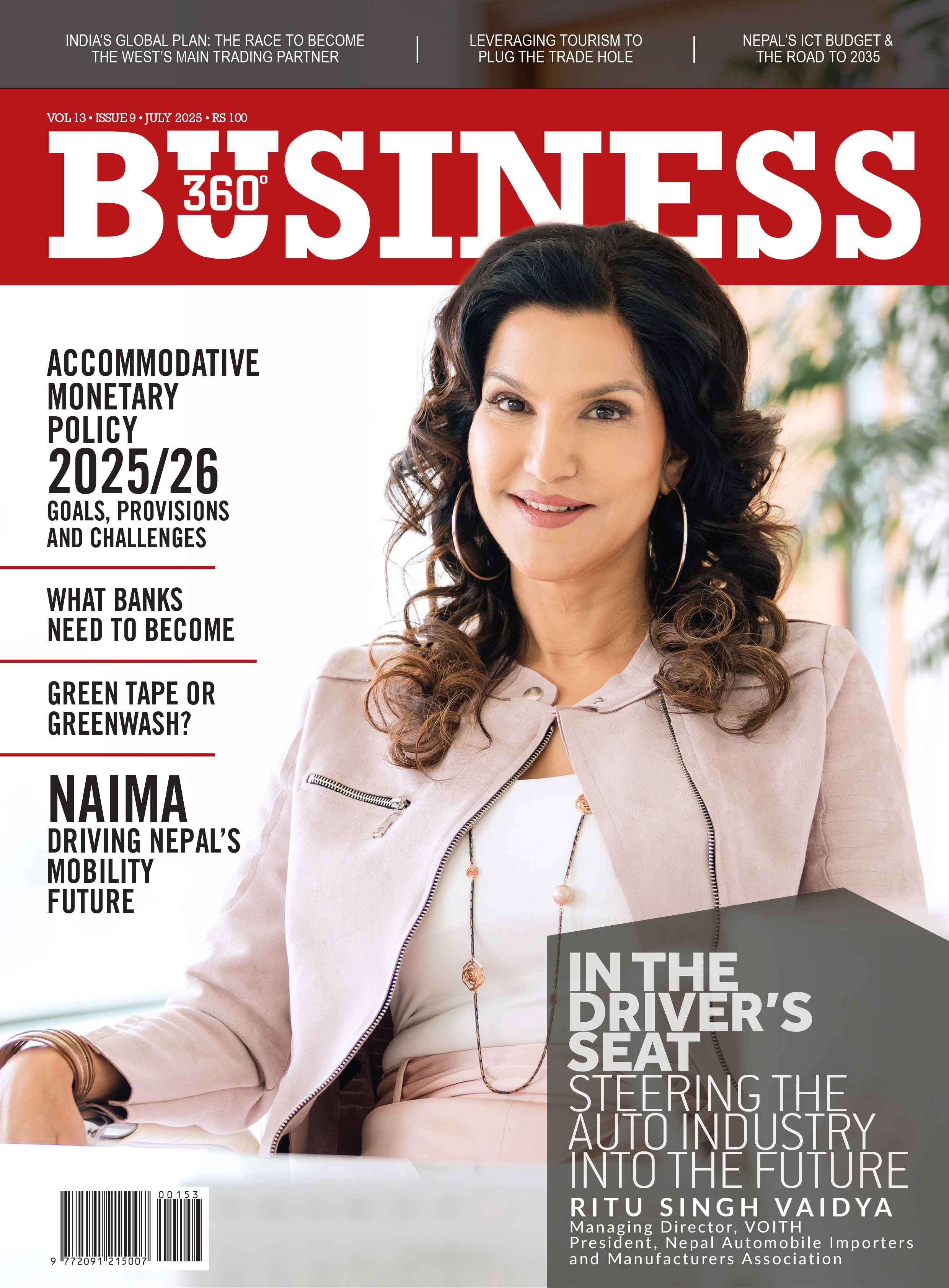-1704007504.jpg)
Radhika Aryal
Principal Secretary, Lumbini Province
Radhika Aryal currently serves as the Principal Secretary of Lumbini Province. Before assuming this role, she contributed her expertise as the Joint Secretary in the Ministry of Industry, Commerce and Supplies, starting in 2021. In the ministry, Aryal spearheaded initiatives in Supply Management and Consumer Right Protection, overseeing nationwide efforts to enhance supply management and advocate for consumer rights. Her influential work includes the development of policies and programmes aimed at strengthening supply chain and trade relations.
Aryal has also worked in the Ministry of Communication and Information Technology and the Ministry of Women, Children and Senior Citizens. She has previously served as a board member with Nepal Telecom, Nepal Television, Radio Nepal, Nepal Oil Corporation and Food Management and Trading Company.
With a civil service career spanning over 19 years, Aryal has represented Nepal in numerous prestigious international forums. These include the United Nations Human Rights Council - Universal Periodic Review 2015 in Geneva, the United Nations Social and Economic Council Commission on the Status of Women in New York, UN ESCAP in Bangkok, the Eurasian Women’s Forum in St Petersburg, Russia, the South Asia Association for Regional Cooperation, and the Colombo Plan.
I believe that in the next ten years, there will be a majority of youth in leadership. I see the need for youth leadership in every field, and politics cannot be left behind. It also seems that the participation of women at the leadership level has been and will increase significantly. Young, competitive and competent leadership is necessary for radical change in the country. We all have to be ready for this
Aryal holds Master’s degrees in Plant Taxonomy and Public Administration from Tribhuvan University and Master of Public Policy (Economics) from the University of Tokyo, Japan. She is currently a Doctoral candidate at the Nepal Sanskrit University.
In this issue of Business 360, we spoke to Aryal on her views about leadership and what it entails. Excerpts:
How do you define leadership?
The definition of leadership varies across different domains and has a particularly unique essence in the civil sector. Leadership is developed when working within the rules, laws and regulations in the civil sector. A civil servant’s leadership is gauged by their ability to meet the aspirations and expectations of the people as well as the government’s policies, instructions and guidance.
Drawing from my civil sector experience, I view leadership as the embodiment of ethical conduct and honesty in fulfilling assigned responsibilities. It involves timely and disciplined execution of tasks. Leadership opportunities arise from one’s work responsibilities and the authority granted to execute these duties. Furthermore, the exercise of one’s rights should always comply with the law and aim to maximise public benefit.
Creating an atmosphere of collective responsibility is crucial. Leadership is not about solitary progress or seeking individual credit; it’s about recognising and valuing the contributions of others. True leadership is demonstrated through fostering a sense of unity, shared identity, and equal participation in decision-making and task execution. It’s in this collective spirit that leadership is not only practiced but also enhanced.
Is leadership in-born or acquired?
I believe leadership is a skill that can be cultivated. It’s a blend of education, skill enhancement, and the development of specific abilities, all nurtured within a conducive work environment. The capacity to assume responsibilities and embrace risks plays a pivotal role in shaping a leader. Beyond these, personal habits and behaviour are crucial elements. Key factors like the ability to mobilise and inspire a group, coupled with a collective mindset, and empathy are essential. Leadership also heavily relies on maintaining a positive outlook and behaviour. These components collectively contribute to the formation and strengthening of effective leadership.
What are the ways to create influence?
The sector I operate in focuses not on amassing followers through influence, but rather on enhancing service delivery within the framework of the legal system. Navigating this landscape involves facing various risks. To effectively manage these risks and achieve tangible results, it’s crucial to take proactive precautions. The key to positively impacting individuals lies in fostering trust in the team, nurturing a sense of collective unity, and embracing shared responsibility. These elements are instrumental in guiding and influencing individuals positively in this context.
One incident that tested your leadership ability and the way you handled it.
Once I got an opportunity to be a part of an international negotiation to discuss a project with a foreign agency. The negotiation had to be done in a way that would derive the maximum benefit for Nepal and believe me, at the end of the negotiation, all agreements were in Nepal’s favour. I took it as a test of my leadership. I believe that success will be achieved by working in such a way that institutional interests and national sentiments are presented without personal interest in the work. Positive thinking prevails in all of my work. I have taken it as my good side. What I believe is: Leadership has to work sensitively in difficult situations, times of crisis and in areas of high risk. Everyone can fulfil their responsibilities and roles in an easy situation. Leadership is tested in times of crisis.
What aspects of your personality have helped you to serve various roles in the past?
My commitment to honesty and integrity in my work, coupled with a clear grasp of the subject matter, have been fundamental in fulfilling my duties. A firm belief in the power of teamwork, coupled with a positive mindset and empathy, have significantly contributed to my effectiveness. Additionally, my unwavering belief in equality and consistent demonstration of unbiased behaviour among colleagues have been pivotal. These qualities have not only aided me greatly but also form the foundation of my past achievements and performance.
What would you personally suggest to effectively lead a team?
To mobilise a group, you need to trust the group and the people in the group. If we can work in such a way, then there is a collective feeling and collective identity and all the members of the group will be ready to take risks as well as fully utilise their individual abilities. It helps to generate synergy within the group and achieve better results.
How can a leader prepare for the unknown?
In order to deal with an unfamiliar situation, leaders should discuss the related issues with the relevant agencies, consult the subject experts, and make a decision with the advice of an experienced person. This will ensure everyone’s acceptance of the decision and everyone will be ready to take the risk that may arise due to it. Even if the risk can be shared, the acceptability of decisions and leadership increases. It also helps bring uncertainty towards certainty.
What leadership style do you follow?
Participatory leadership.
Is there any ideal leader you look up to and why?
I have always looked closely at my immediate bosses and the role played by them in the context of their work. The methods and procedures adopted by them while performing work has guided me. Additionally, I have received positive insights from various leaders who have worked in other fields. Different people have different qualities and I adopt the qualities that suit my values and I use it during my performance.
What would you suggest to young emerging leaders?
Working with a mindset rooted in positivity and shared objectives is crucial. This approach not only aids in problem-solving but also significantly mitigates risks.
How do you imagine the leadership of Nepal in the next ten years?
I believe that in the next ten years, there will be a majority of youth in leadership. I see the need for youth leadership in every field, and politics cannot be left behind. It also seems that the participation of women at the leadership level has been and will increase significantly. Young, competitive and competent leadership is necessary for radical change in the country. We all have to be ready for this.



-(1)-1752214965.jpg)
-1744698999.jpg)
